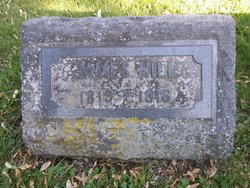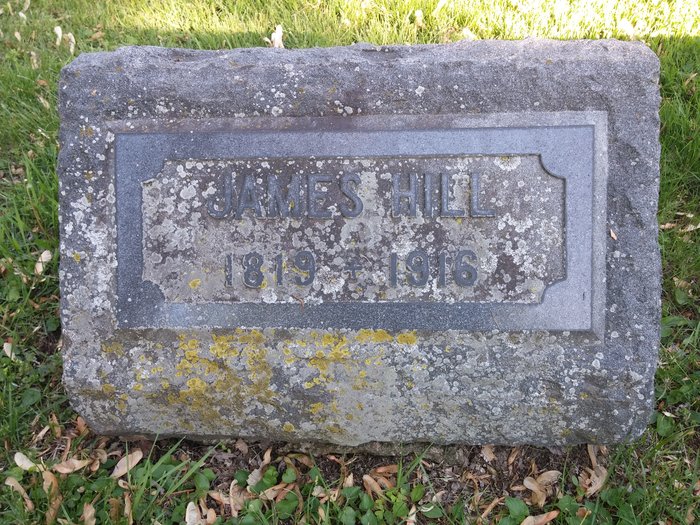Sister Eliza Hill Huber Fag# 103890516
James Hill was born November 13, 1819, near Marietta, Ohio. His father was Capt. William Hill, who served in the War of 1812; his mother, also named Hill, was the daughter of an officer of colonial troops in the Revolutionary war, from Maryland. He was one of twelve children, eight boys and four girls, nearly all of them well known to people in Lafayette county, where the family finally located, and where several brothers and sisters are buried. His sister, Ruth Hill, was among the early school teachers in the schools of Wisconsin. Mrs. Jane Dunbar, Mrs. Eliza Huber and several of the sons left families with us.
So it is that one by one, all the first settlers of this region are passing out into Peace.
Among our oldest people there will be some who will recognize the name of James Hill, a well known resident of Shullsburg most of the time from 1839 to 1850. When the California excitement broke out in 1849, Mr. Hill formed a company with fifteen other young men including his brothers Sam and Silas, and started in the spring of 1850 to cross the plains for the gold mines. They left the Missouri river at St. Joseph, Mo., and the time consumed to Ringold the first settlement in California, was just 100 days. About 700 miles out from the settlements they lost their horses through sickness and fatigue, and, packing what they could on the backs of a couple of remaining horses, started on, a foot. They ran out of provisions and many a morning their only food for the day was a tin cupful of coffee on which to travel. At one point in what is now Utah they bought an exhausted ox for $50, butchered it and dried and smoked the meat, and Mr. Hill said that, while it was the color and toughness of rubber, it sustained life. When they had eaten all of it, except one kettleful, they went into camp one night, and before long a horseman came along and asked permission to camp with them, saying he was alone. The permission was given, and when they awoke in the morning, the horseman, kettle, dried beef and all were gone. They hadn't a mouthful to eat. Mr. Hill took his rifle and went out hunting, seeing a great many more Indian tracks than those of jack rabbits, but finally shot a rabbit. On the way to camp, he passed a party of men of whom he offered to buy anything they would sell him to eat; he finally bargained with them to sell him a few pounds of navy beans, and paid $5 for what he could carry away in a small handkerchief. With the rabbit and the beans the company fixed up a square meal, then went on, reaching Ringold flat broke, barefooted and half famished, clothes in rags, and with no visible means of getting anything to eat or tools to mine with.
Walking along the street, Mr. Hill met a German whom he had known in Wisconsin to whom he told his condition, and asked him if he could stake him. The man said, "Well, Jim, you were always considered an honest man, and I'll do what I can for you." So he went with him to the store and told the keeper to let him have what he wanted, and he would be security for him. In that way he got his start as a miner.
He landed in California in Aug. 1850, and stayed there until the summer of 1856, when the notion took him to "go back to the States" and he came home by the water route around to New York City, and on the way to Wisconsin, he visited his old home at Marietta, Ohio, then went on to Wisconsin, expecting to spend several months and then return to California; but his plans were interrupted, and on June 13, 1858, he was married to Mary A.F. Watts, at Center, Wis.
To this union was born four children, only two of whom, the oldest and the youngest sons, survive. He removed to Darlington, Wis., then to Sedalia, Mo., in 1871. At the age of 70 years, he became totally deaf, and had never heard a sound thereafter. In Jan. 1905 Mr. and Mrs. Hill went to Norwalk, Ohio, to live with their youngest son, where Mrs. Hill died March 21, 1910. In February 1913, the old gentleman fell and broke his right leg just above the ankle, and in March, 1915, he was attacked by grip, resulting in pneumonia, both of which he survived only to be carried off by an attack of grip January 12, 1916, at the age of 96 yrs. and 2 months and was buried beside his wife, in Norwalk, Ohio.
He is survived by one sister, Mrs. Mary Wilson who lives with her granddaughter at Lincoln, Neb. He is also survived by two sons and six grandchildren.
Shullsburg Pick and Gad 27 Jan 1916
Sister Eliza Hill Huber Fag# 103890516
James Hill was born November 13, 1819, near Marietta, Ohio. His father was Capt. William Hill, who served in the War of 1812; his mother, also named Hill, was the daughter of an officer of colonial troops in the Revolutionary war, from Maryland. He was one of twelve children, eight boys and four girls, nearly all of them well known to people in Lafayette county, where the family finally located, and where several brothers and sisters are buried. His sister, Ruth Hill, was among the early school teachers in the schools of Wisconsin. Mrs. Jane Dunbar, Mrs. Eliza Huber and several of the sons left families with us.
So it is that one by one, all the first settlers of this region are passing out into Peace.
Among our oldest people there will be some who will recognize the name of James Hill, a well known resident of Shullsburg most of the time from 1839 to 1850. When the California excitement broke out in 1849, Mr. Hill formed a company with fifteen other young men including his brothers Sam and Silas, and started in the spring of 1850 to cross the plains for the gold mines. They left the Missouri river at St. Joseph, Mo., and the time consumed to Ringold the first settlement in California, was just 100 days. About 700 miles out from the settlements they lost their horses through sickness and fatigue, and, packing what they could on the backs of a couple of remaining horses, started on, a foot. They ran out of provisions and many a morning their only food for the day was a tin cupful of coffee on which to travel. At one point in what is now Utah they bought an exhausted ox for $50, butchered it and dried and smoked the meat, and Mr. Hill said that, while it was the color and toughness of rubber, it sustained life. When they had eaten all of it, except one kettleful, they went into camp one night, and before long a horseman came along and asked permission to camp with them, saying he was alone. The permission was given, and when they awoke in the morning, the horseman, kettle, dried beef and all were gone. They hadn't a mouthful to eat. Mr. Hill took his rifle and went out hunting, seeing a great many more Indian tracks than those of jack rabbits, but finally shot a rabbit. On the way to camp, he passed a party of men of whom he offered to buy anything they would sell him to eat; he finally bargained with them to sell him a few pounds of navy beans, and paid $5 for what he could carry away in a small handkerchief. With the rabbit and the beans the company fixed up a square meal, then went on, reaching Ringold flat broke, barefooted and half famished, clothes in rags, and with no visible means of getting anything to eat or tools to mine with.
Walking along the street, Mr. Hill met a German whom he had known in Wisconsin to whom he told his condition, and asked him if he could stake him. The man said, "Well, Jim, you were always considered an honest man, and I'll do what I can for you." So he went with him to the store and told the keeper to let him have what he wanted, and he would be security for him. In that way he got his start as a miner.
He landed in California in Aug. 1850, and stayed there until the summer of 1856, when the notion took him to "go back to the States" and he came home by the water route around to New York City, and on the way to Wisconsin, he visited his old home at Marietta, Ohio, then went on to Wisconsin, expecting to spend several months and then return to California; but his plans were interrupted, and on June 13, 1858, he was married to Mary A.F. Watts, at Center, Wis.
To this union was born four children, only two of whom, the oldest and the youngest sons, survive. He removed to Darlington, Wis., then to Sedalia, Mo., in 1871. At the age of 70 years, he became totally deaf, and had never heard a sound thereafter. In Jan. 1905 Mr. and Mrs. Hill went to Norwalk, Ohio, to live with their youngest son, where Mrs. Hill died March 21, 1910. In February 1913, the old gentleman fell and broke his right leg just above the ankle, and in March, 1915, he was attacked by grip, resulting in pneumonia, both of which he survived only to be carried off by an attack of grip January 12, 1916, at the age of 96 yrs. and 2 months and was buried beside his wife, in Norwalk, Ohio.
He is survived by one sister, Mrs. Mary Wilson who lives with her granddaughter at Lincoln, Neb. He is also survived by two sons and six grandchildren.
Shullsburg Pick and Gad 27 Jan 1916
Family Members
Sponsored by Ancestry
Advertisement
Records on Ancestry
Advertisement










